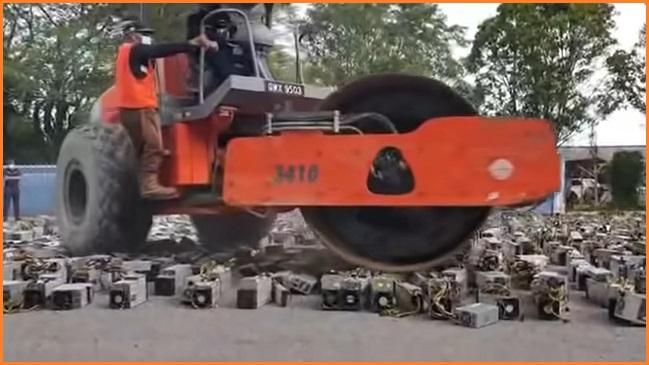Police in Malaysia steamrolled 1,069 bitcoin mining devices seized in raids on cryptocurrency miners earlier this year.
After laying out the devices in a precinct car park, local authorities destroyed the rectangular grey boxes by running over them with a large orange steamroller, as seen in footage posted online by local news site Dayak Daily.
The devices were application-specific integrated circuits (ASICs) built for the express purpose of completing proof-of-work tasks needed to find blocks in cryptocurrency networks like bitcoin.
Police arrested eight people in connection with the bitcoin miners which had allegedly been powered by $2.7 million worth of stolen electricity.
“The crypto-miners stole electricity,” Assistant Police Commissioner Hakemal Hawari told the Agence France-Presse.
“Their actions are dangerous for life and property, as they can cause power outages.”
Police conducted six raids on properties around the Miri International Airport between February and April this year after a local electricity company noticed unusual activity on its network.
Six of the suspects were jailed for up to eight months and fined 8,000 Malaysian Ringgit ($2,560).
Malaysia is one of the top 10 countries for bitcoin mining, according to the Cambridge Centre for Alternative Finance, making up around 3.4 pre cent of the global bitcoin hash rate in April.
The global hash rate is the amount of cryptographic hashes completed by computers mining on the bitcoin network.
Individual computers race to find, by chance, the winning hash that completes the latest block in the chain and sees them rewarded by the Bitcoin network.
The network currently runs at around 100 million terahashes per second (TH/s) – down from its peak at 180 million TH/s in May when cryptocurrency prices were at an all-time high.
A major crackdown by Chinese authorities saw the country effectively ban mining and has since seen its share of the global hash rate continue to fall well below the 50 per cent mark.
Bitcoin’s high energy use has been a major source of criticism for the original cryptocurrency with Elon Musk helping drive the price down by casting doubts on the networks viability given its current environmental impact.
It’s unknown exactly how much of the bitcoin network is powered by electricity siphoned off the grid, but Malaysian police aren’t the only ones to find miners stealing power.
As cryptocurrency prices were peaking in May, English police investigating a suspected cannabis farm were surprised to discover a clandestine bitcoin mining operation.
The miners had wired up 100 ASICs in a warehouse near a local electricity distribution centre in what police said “had all the hallmarks of a cannabis cultivation set-up”.
Sandwell Police did not choose to destroy the bitcoin mining devices with a steamroller.










